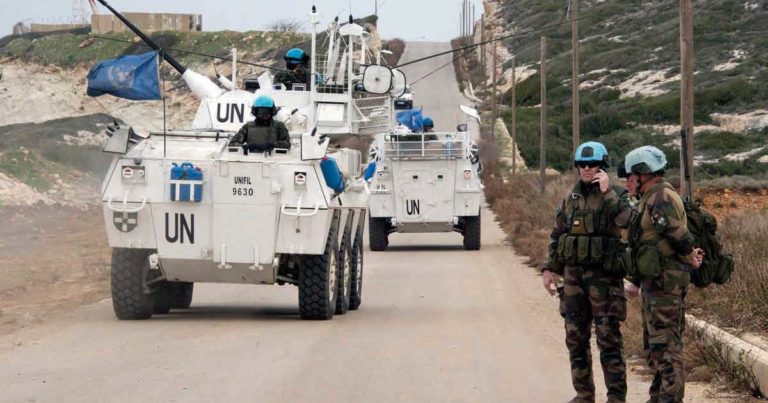United Nations Interim Force in Lebanon-UNIFIL
Tony Badran/FDD/July 06/2021
طوني بدران/القوات الدولية “اليونيفل” في لبنان
CONTENTS
International Organizations Monograph
Introduction
UN Security Council Resolutions (UNSCRs) 425 and 426 established the UN Interim Force in Lebanon (UNIFIL) in 1978 following Israel’s Operation Litani in southern Lebanon. UNIFIL was tasked with “confirming the withdrawal of Israeli forces, restoring international peace and security and assisting the Government of Lebanon in ensuring the return of its effective authority in the area.”
In 2006, after the war between Israel and Hezbollah, UNSCR 1701 increased UNIFIL’s size and updated its mandate. The force ballooned to over 10,000 soldiers (with a troop ceiling of 15,000) and employed a civilian staff of around 900 employees, both foreign and local. UNIFIL’s annual budget stands at around $512 million, of which the United States contributes roughly 28 percent, or about $145 million.
UNSCR 1701 mandates UNIFIL to “accompany and support the Lebanese armed forces [LAF] as they deploy throughout the South, including along the Blue Line” with Israel, and to assist the LAF in “the establishment between the Blue Line and the Litani river of an area free of any armed personnel, assets and weapons other than those of the Government of Lebanon and of UNIFIL deployed in this area.”
The references to armed personnel and weapons are understood to mean Hezbollah and its arsenal. UNSCR 1701 also authorizes UNIFIL “to take all necessary action in areas of deployment of its forces … to ensure that its area of operations is not utilized for hostile activities of any kind,” and “to resist attempts by forceful means to prevent it from discharging its duties.”
UNIFIL includes a naval component, the Maritime Task Force, consisting of five ships, to support the Lebanese Navy in “preventing the unauthorized entry of arms or related materiel by sea into Lebanon.”
Problems
Hezbollah’s infrastructure and capabilities have grown exponentially since 2006 under UNIFIL’s nose. The group actually uses UNIFIL’s area of operations for cross-border attacks into Israel, including breaches of the border fence. In addition, Hezbollah erects observation and intelligence-gathering posts along the border through a front environmental group connected to Hezbollah.
At the same time, the LAF impedes UNIFIL’s monitoring of the Blue Line, according to a former UNIFIL liaison officer, a fact also noted in the UN secretary-general’s latest report on the implementation of UNSCR 1701.
Hezbollah also constrains UNIFIL’s freedom of operation with attacks on the force’s patrols as well as with harassment and obstruction by what are commonly referred to as “local civilians.”
Video of a 2018 attack showed Hezbollah operatives assaulting a UNIFIL vehicle and disarming its soldiers.
In 2020, “local civilians” mobbed and obstructed a Finnish patrol in the village of Blida.
Former officers note how these attacks impeded UNIFIL’s access to villages. The officers have also observed inertia at the command level, which seeks to avoid confronting Hezbollah.
The LAF also inhibits UNIFIL by demanding that UNIFIL seek prior authorization before inspecting “private property” – a pretext to deny access to suspect sites. The LAF, for example, has denied UNIFIL requests to inspect a series of Hezbollah attack tunnels revealed by Israel in 2018. The LAF further restricts UNIFIL’s movement by regularly objecting to patrol routes UNIFIL proposes, under the pretext that they are “private roads.”
Lebanese officials claim that inspecting Hezbollah arms depots or removing its weapons from the area south of the Litani, UNIFIL’s area of operations, is out of the question. Former U.S. Ambassador to the United Nations Kelly Craft therefore described the Lebanese government as an accomplice of Hezbollah in obstructing and denying UNIFIL access.
UNIFIL’s Maritime Task Force, which is supposed to ensure no illegal weapons are smuggled to Hezbollah by sea, is limited by its mandate, which authorizes the force merely to hail suspect vessels and then refer them to the LAF navy for inspection.
In 2019, Israel briefed the Security Council that Iran was smuggling “dual-use items” by sea, specifically through the Port of Beirut, “to advance Hezbollah’s rocket and missile capabilities.”
This is likely a reference to Hezbollah’s lethal and growing precision-guided munitions arsenal, provided by Iran in recent years. But none of the 15,000 ships referred to the Lebanese authorities for inspection have ever been declared to be carrying materiel for Hezbollah. This suspicious behavior continues. In the period between June and October 2020, UNIFIL referred 245 vessels to the LAF for inspection. According to the UN secretary-general’s report on that period, six of those referrals “were not acted upon.” UNIFIL did not receive clarification as to why.19
Recommendations
The Trump administration failed to amend UNIFIL’s mandate to allow for more robust patrolling, unrestricted access, and increased freedom of operation. In 2020, the United States threatened to veto renewal of the force’s mandate unless modest reforms were adopted. Under diplomatic pressure, the Trump administration backed down and supported the mandate’s renewal with minor changes that did not alter the longstanding status quo.
Given UNIFIL’s long record of failure, the Biden administration and Congress should consider the following policy options:
Veto UNIFIL’s mandate. The Security Council and troop-contributing nations are highly unlikely to agree to structural changes necessary for UNIFIL to bypass the obstruction by Hezbollah and the Lebanese authorities. Consequently, UNIFIL’s continued failure to enforce an area of operations “free of any armed personnel, assets and weapons” that is “not utilized for hostile activities of any kind” is a foregone conclusion. Therefore, the only meaningful way forward is to veto the renewal of UNIFIL’s mandate at the Security Council in August 2021.
Transfer UNIFIL’s liaison function to the Office of the UN Special Coordinator for Lebanon. UNIFIL’s liaison function, which consists of the Tripartite Forum with the Israel Defense Forces and the LAF, is sometimes cited as a useful mechanism worth keeping. However, retaining the forum does not require keeping a bloated force with a half-billion-dollar budget. The liaison function requires a staff of no more than a dozen people.
Withhold Funding. If the Biden administration extends the status quo and renews UNIFIL’s mandate, which has failed to advance U.S. interests, Congress should withhold U.S. assessed contributions to UNIFIL.
Notes
UN Security Council, Resolution 425, March 19, 1978. (http://unscr.com/en/resolutions/425); UN Security Council, Resolution 426, March 19, 1978. (http://unscr.com/en/resolutions/426)
UN Security Council, Resolution 1701, August 11, 2006. (http://unscr.com/en/resolutions/1701)
UN Interim Force in Lebanon, “UNIFIL Maritime Task Force,” accessed May 27, 2021. (https://unifil.unmissions.org/unifil-maritime-task-force)
Tony Badran, “Hezbollah’s Environmental Warriors,” Tablet Magazine, June 27, 2017. (https://www.tabletmag.com/sections/israel-middle-east/articles/hezbollahs-environmental-warriors); Dion Nissenbaum and Nazih Osseiran, “A Row Over Trees Could Spark the Next Israel-Lebanon War,” The Wall Street Journal, June 28, 2020. (https://www.wsj.com/articles/a-row-over-trees-could-spark-the-next-israel-lebanon-war-11593345635)
Maxime Perez, “Le blues des Casques bleus au Liban,” Le Journal du Dimanche (France), February 23, 2018. (https://www.lejdd.fr/International/Moyen-Orient/au-liban-le-blues-des-casques-bleus-3578882)
READ MORE



















